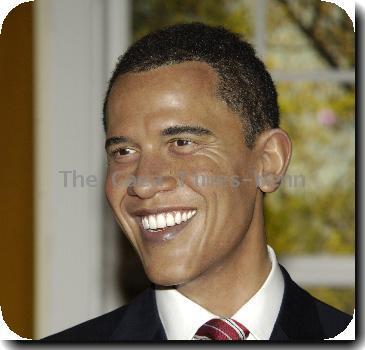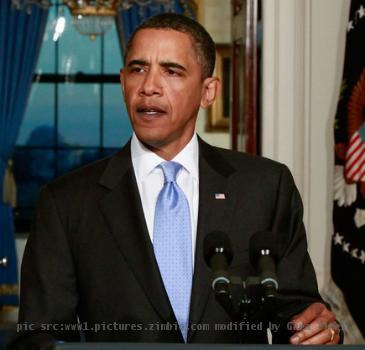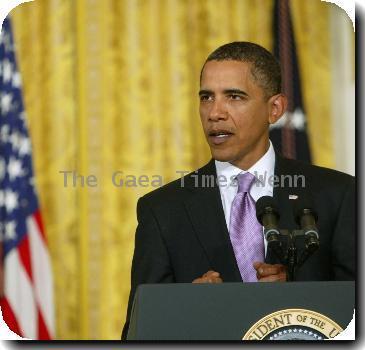Obama seeks tighter control of derivatives, promises no bailouts in new regulation bill
By Jim Kuhnhenn, APWednesday, April 14, 2010
Obama, GOP wrangle over Wall Street regulations
WASHINGTON — The White House and congressional Republicans sparred Wednesday over how to protect taxpayers against “too big to fail” financial institutions, sharply disagreeing on whether legislation backed by President Barack Obama would leave the government on the hook for bailing out firms whose failure might threaten the economy.
Obama, meeting with House and Senate leaders of both parties, insisted on a tough bill, specifically singling out oversight of previously unregulated financial instruments. How to regulate these products, known as derivatives, has become the latest point of friction between Democrats and Republicans.
But as the Senate prepares to begin debate in less than two weeks on legislation revamping regulation of the financial industry, the question of bailouts has elevated the sharp partisan differences over how to respond to the 2008 crisis that caused a near meltdown on Wall Street.
Both sides were testing populist messages, seizing on public disdain for big financial institutions. The White House argued opposition to the bill amounted to support for Wall Street banks; Republicans countered that the Obama-backed bill would perpetuate bailouts for Wall Street firms rather than end them.
Obama, speaking briefly to reporters before the closed meeting began, said he was “absolutely confident that the bill that emerges is going to be a bill that prevents bailouts. That’s the goal.”
Treasury Secretary Timothy Geithner later said that the cost of taking down large failing financial institutions will be borne by big banks, not taxpayers. The House and Senate bills call for funds, financed by large financial institutions, to cover the costs of liquidating firms deemed too large to go through bankruptcy proceedings. Republicans have argued that the funds would not be sufficient and that taxpayers could still be on the hook to pay to deal with giant failures. They also argue that emergency loan authority by the Federal Reserve could also amount to a financial bailout.
The give-and-take, which officials said was more heated in public than in private, set the terms for the final debate on yet another of Obama’s priorities. The president is hoping the Senate acts quickly and passes a bill that can be easily reconciled with legislation that passed the House in December. But Democrats need at least one Republican to overcome procedural hurdles and the looming question was whether the administration and Senate Majority Leader Harry Reid would simply seek to pick off Republican senators or build a coalition through bipartisan negotiations.
Geithner was to discuss the legislation Thursday with Sen. Scott Brown, a Massachusetts Republican who has already broken ranks with his party on jobs and jobless benefits votes.
Reid signaled Wednesday that he was ready to proceed quickly. Reid had initially planned to bring the bill up the week of April 26, but officials said Wednesday that he now might seek to begin debate next week.
Asked after the White House meeting whether it was time to abandon efforts to negotiate with Republicans, Reid said: “We’re going to move on the bill very quickly. They can offer all the amendments they want on the floor.”
Sen. Christopher Dodd, the chairman of the Senate Banking Committee, agreed to meet again with the committee’s top Republican, Sen. Richard Shelby of Alabama. Aides said Dodd, D-Conn., believed he and Shelby could add language to the bill that would address the bailout question without fundamentally altering the bill.
Sen. Bob Corker, R-Tenn., a banking committee member who has negotiated with Dodd, said the rhetoric over potential bailouts had become overheated. “The fact is,” he added, “I think we could fix those in about five minutes.”
Earlier, Dodd angrily accused Republicans of “political chicanery” and appeared on the verge of abandoning talks.
“My patience is running out, my patience is running out,” he said from the Senate floor. “I’m not going to continue doing this if all I’m getting from the other side is the suggestions somehow that this is a partisan effort.”
Aides said Senate Republican Leader Mitch McConnell in the meeting urged Obama not to cut off bipartisan talks. Afterward, McConnell still insisted that the Senate bill “will lead to endless taxpayer bailouts of Wall Street banks.”
That was the message McConnell delivered earlier Wednesday on the Senate floor — the second such attack on the bill in as many days. He said the White House plans the same approach on financial reforms that it took on health care: “Put together a partisan bill, then jam it through on a strictly partisan basis.”
White House economist Austan Goolsbee dismissed the GOP objections as “totally disingenuous.”
“Bailouts are forbidden,” he said in an interview. “There will only be wipeouts. They (the banks) will clean up the messes. If somebody fails, they’re done — they’re toast. The management is fired. They’re broken up or sold off or liquidated.”
Goolsbee added the GOP broadside was “pretty cheeky of the Republican leadership,” and an effort to divert attention from its efforts to stop regulation of the derivatives market. “They’re trying to dramatically weaken and put loopholes into that derivatives regulation,” he said.
Republicans think they continue to score huge points with voters by opposing the health care overhaul that narrowly passed Congress with no GOP votes. They are taking a similar approach on financial regulations.
The White House says GOP lawmakers are using campaign strategist talking points to label the legislation as a bank bailout, regardless of the truth.
Associated Press writers Charles Babington, Mark S. Smith and Erica Werner contributed to this report.
Tags: Barack Obama, Congress, District Of Columbia, Government Regulations, Health Care Reform, Industry Regulation, North America, Political Issues, Political Organizations, Political Parties, United States, Washington









